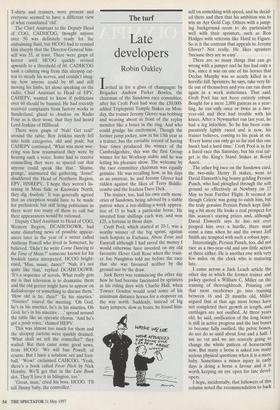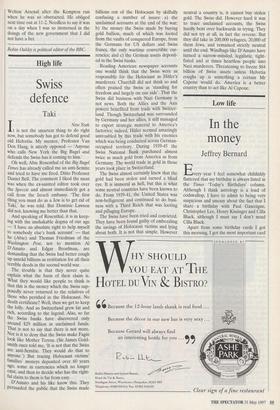The turf
Late developers
Robin Oakley
Invited in for a glass of champagne by Brigadier Andrew Parker Bowles, the chairman of the Sandown race committee, after his Croft Pool had won the £50,000- added Tripleprint Temple Stakes on Mon- day, the trainer Jeremy Glover was bobbing and weaving about in front of the replay monitor like a boxer in the ring. And who could grudge his excitement. Though the former jump jockey, now in his 13th year as a trainer, has the enviable record of having four times produced the winner of the Cambridgeshire, this was the first Group winner for his Worksop stable and he was letting his pleasure show. The welcome by the race committee chairman was equally genuine. He was recalling how, in his days as an amateur, he and Jeremy Glover had ridden against the likes of Terry Biddle- combe and the fearless Dave Dick.
The trainer, too, had his own early mem- ories of Sandown, being advised by a stable patron when a ten-shilling-a-week appren- tice of 15 to back a particular horse. He invested four shillings each way, and won £25, a fortune in those days.
Croft Pool, which started at 20-1, was a worthy winner of the big sprint, against such hotpots as Farhana, Abou Zouz and Easycall although I had saved the money I would otherwise have invested on my old favourite Hever Golf Rose when the train- er Joe Naughton told me before the race that she was favoured neither by the ground nor by the draw.
Jack Berry was reminiscing the other day how he had become fascinated by sprinters in his riding days with Charlie Hall, when Towser Gosden would send some of his minimum distance horses for a stopover on the way north.. Suddenly, instead of big hairy jumpers, slow as boats, he found him- self on something with speed, and he decid- ed there and then that his ambition was to win an Ayr Gold Cup. Others with a jump- ing background seem to do particularly well with their sprinters, such as Ron Hodges with veterans like Hard to Figure. So is it the contrast that appeals to Jeremy Glover? Not really. He likes sprinters `because they are so easy'.
There are so many things that can go wrong with a jumper and he has had only a few, since it was on one of his horses that Declan Murphy was so nearly killed in a horrific fall. Sprinters, he says, take very lit- tle out of themselves and you can run them again in a week sometimes. That said, Croft Pool has not been entirely robust. Bought for a mere 2,000 guineas as a year- ling, he ran only once or twice as a two- year-old and then had trouble with his knees. After a Newmarket run last year, he had a leg infection. So he has been com- paratively lightly raced and is now, his trainer believes, coming to his peak at six. `Every horse can only go so far and this one hasn't had a hard time.' Croft Pool is in for a listed race this Saturday, but his real tar- get is the King's Stand Stakes at Royal Ascot.
The other big race on the Sandown card, the two-mile Henry II stakes, went to David Elsworth's big bonny gelding Persian Punch, who had ploughed through the soft ground so effectively at Newbury on 17 May to beat Further Flight. It seemed as though Celeric was going to catch him, but the truly genuine Persian Punch kept find- ing a bit more He looks a real prospect for this season's staying prizes and, although David Elsworth says he has not ever pooped him over a hurdle, there must come a time when he and the owner Jeff Smith are tempted with such a robust type.
Interestingly, Persian Punch, too, did not race as a two-year-old and saw little action at three either. He is another one with very few miles on the clock who is maturing late.
I came across a Jack Leach article the other day in which the former trainer and jockey quoted a William C. Miller on the training of thoroughbreds. Pointing out that most racehorses go into training between 16 and 20 months old, Miller argued that at that age most bones have not completed their growth in length, and cartilages are not ossified. At three years old, he said, ossification of the long bones is still in active progress and the last bones to become fully ossified, the pelvic bones, do not do so until about four and a half. I am no vet and we are scarcely going to change the whole pattern of horseracing now. But many a horse is asked too many serious physical questions when it is a mere baby. Sometimes a minor injury in early days is doing a horse a favour and it is worth keeping an eye open for late devel- opers. I hope, incidentally, that followers of this column noted the recommendation to back Welton Arsenal after the Kempton run when he was so obstructed. He obliged next time out at 11-2. Needless to say it was on a day when I was so immersed in the doings of the new government that I did not have a bet.
Robin Oakley is political editor of the BBC.



































































 Previous page
Previous page